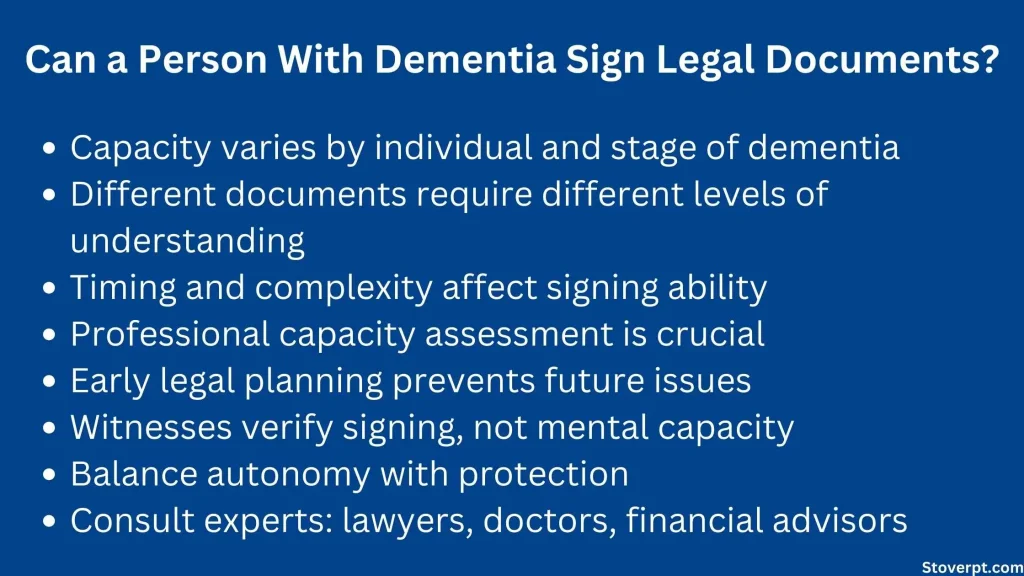Can Someone With Dementia Sign Legal Documents?

As a physical therapist specializing in senior care, I often encounter questions about the legal rights and capabilities of individuals with dementia. One of the most common questions is whether someone with dementia can sign legal documents.
The short answer is: it depends. In general, a person with dementia may be able to sign legal documents if they have the mental capacity to understand what they’re signing at the time of signing. However, this can be a complex issue that requires careful consideration of various factors.
Understanding Dementia and Legal Capacity
Before we dive deeper into this topic, let’s clarify some important terms and concepts:
What is Dementia?
Dementia is not a specific disease, but rather a general term for a decline in mental ability severe enough to interfere with daily life. It affects memory, thinking, orientation, comprehension, calculation, learning capacity, language, and judgment. Alzheimer’s disease is the most common form of dementia.
What is Legal Capacity?
Legal capacity refers to an individual’s ability to understand and appreciate the nature and consequences of their decisions, including the ability to make and communicate informed choices. When it comes to signing legal documents, a person needs to have legal capacity.
The Complexity of Dementia and Legal Decisions
Dementia is a progressive condition, which means it gets worse over time. This progression can affect a person’s ability to make decisions and understand complex information. However, it’s important to note that:
- Dementia affects each person differently
- The progression of dementia can vary greatly from person to person
- A person with dementia may have good days and bad days
Because of these factors, determining whether someone with dementia can sign legal documents isn’t always straightforward.
Factors Affecting the Ability to Sign Legal Documents
When considering whether a person with dementia can sign legal documents, several factors come into play:
- Stage of dementia: Early-stage dementia may not significantly impact a person’s decision-making abilities, while late-stage dementia likely will.
- Type of document: Some documents require a higher level of understanding than others. For example, understanding a simple power of attorney might be easier than comprehending a complex business contract.
- Timing: A person with dementia might have periods of greater lucidity, often called “moments of clarity.” During these times, they may be more capable of understanding and signing documents.
- Complexity of the decision: Simpler decisions may be easier for someone with dementia to understand compared to more complex ones.
- Potential for undue influence: It’s crucial to ensure that the person isn’t being pressured or manipulated into signing something they don’t fully understand.

The Importance of Capacity Assessment
Given these complexities, it’s often necessary to conduct a capacity assessment before allowing someone with dementia to sign legal documents. This assessment typically involves:
- Medical evaluation: A doctor, often a neurologist or geriatrician, will assess the person’s cognitive function and decision-making abilities.
- Legal consultation: An attorney can help determine if the person meets the legal requirements for capacity in your jurisdiction.
- Functional assessment: This looks at how well the person can perform daily tasks and make decisions in their everyday life.
- Cognitive tests: These can include memory tests, problem-solving tasks, and assessments of judgment and reasoning.
- Interview with the individual: This allows professionals to gauge the person’s understanding of the document and its implications.
Types of Legal Documents and Dementia
Different types of legal documents may require different levels of capacity. Here’s a brief overview:
1) Will: To make a valid will, a person generally needs to understand:
- The nature and extent of their property
- Who would naturally inherit their property
- The practical effect of the will in question
2) Power of Attorney: The person must understand:
- What powers they’re granting
- To whom they’re granting these powers
- The implications of granting these powers
3) Healthcare Directive: The individual should understand:
- The types of medical decisions that might need to be made
- Who they’re authorizing to make these decisions
- The potential consequences of these decisions
4) Contracts: The person must comprehend:
- The nature of the agreement
- Their obligations under the contract
- The consequences of entering into the contract
The Importance of Early Planning
One of the most crucial pieces of advice I give to seniors and their families is to plan early. It’s much easier to put legal documents in place before dementia progresses to a point where capacity becomes questionable. Early planning can include:
- Creating a will: This ensures your assets are distributed according to your wishes.
- Assigning power of attorney: This allows you to choose someone you trust to make decisions on your behalf if you become unable to do so.
- Establishing a healthcare directive: Also known as a living will, this document outlines your preferences for medical care if you’re unable to communicate them yourself.
- Setting up a trust: This can provide for the management of your assets during your lifetime and their distribution after your death.
What Happens if Someone with Dementia Signs a Document?
If a person with dementia signs a legal document, several scenarios could unfold:
- The document could be considered valid: If the person had the necessary capacity at the time of signing, the document would likely be upheld.
- The document could be challenged: If there are concerns about the person’s capacity at the time of signing, the document could be contested in court.
- The document could be declared invalid: If it’s determined that the person lacked capacity when signing, a court might rule the document invalid.
The Role of Witnesses and Notaries
When someone with dementia is signing a legal document, the presence of witnesses and/or a notary can be crucial. They can help to establish that:
- The person signing appeared to understand what they were signing
- The signature was made willingly and without apparent coercion
- The person was in a lucid state at the time of signing
However, it’s important to note that witnesses and notaries are not typically qualified to make capacity determinations. Their role is to verify identity and willingness to sign, not to assess mental capacity.
Protecting the Rights of Individuals with Dementia
As a healthcare professional working with seniors, I believe it’s crucial to strike a balance between protecting individuals with dementia and respecting their autonomy. Some key principles include:
- Presumption of capacity: We should assume a person has capacity unless there’s clear evidence to the contrary.
- Supported decision-making: When possible, we should provide support to help individuals with dementia make their own decisions.
- Least restrictive alternative: Any interventions should be the least restrictive necessary to protect the person’s interests.
- Respect for personal values: Decisions should take into account the person’s known wishes, beliefs, and values.
- Protection from exploitation: Safeguards should be in place to protect vulnerable individuals from abuse or undue influence.

Legal and Ethical Considerations
The question of whether someone with dementia can sign legal documents raises several legal and ethical issues:
- Autonomy vs. protection: There’s a delicate balance between respecting an individual’s right to make their own decisions and protecting them from potential harm.
- Fluctuating capacity: Dementia can cause good days and bad days, making it challenging to determine when someone has the capacity to sign documents.
- Undue influence: There’s a risk that others might take advantage of a person with dementia, pressuring them to sign documents against their best interests.
- Validity of previous documents: Questions can arise about the validity of documents signed before a dementia diagnosis but when symptoms may have been present.
- Cultural considerations: Different cultures may have varying views on decision-making and the role of family in caring for individuals with dementia.
The Importance of Professional Guidance
Given the complexities surrounding this issue, it’s crucial to seek professional guidance when dealing with legal documents and individuals with dementia. This might include:
- Elder law attorneys: These lawyers specialize in legal issues affecting seniors, including capacity and estate planning.
- Geriatricians: Doctors specializing in the care of older adults can provide valuable insights into a person’s cognitive abilities.
- Neuropsychologists: These professionals can conduct detailed cognitive assessments to help determine capacity.
- Social workers: They can provide support and guidance to individuals with dementia and their families.
- Financial advisors: They can help ensure that financial decisions align with the person’s best interests and previous wishes.
Practical Tips for Families and Caregivers
If you’re caring for someone with dementia who needs to sign legal documents, consider these tips:
- Act early: Encourage your loved one to put legal documents in place as soon as possible after a dementia diagnosis.
- Choose the right time: If documents need to be signed, choose a time of day when your loved one is typically most alert and comfortable.
- Create a supportive environment: Ensure the signing takes place in a quiet, familiar setting without distractions.
- Explain clearly: Use simple language to explain the document and its implications. Be patient and allow time for questions.
- Look for signs of understanding: Ask your loved one to explain the document back to you in their own words.
- Be alert for undue influence: Ensure that your loved one isn’t being pressured or manipulated into signing.
- Consult professionals: When in doubt, seek advice from legal and medical professionals.
Common Misconceptions
There are several misconceptions about dementia and legal capacity that are worth addressing:
- Myth: A dementia diagnosis automatically means a person can’t sign legal documents.
Reality: Capacity is decision-specific and can fluctuate. A diagnosis alone doesn’t determine capacity. - Myth: Once someone loses capacity, they can never regain it.
Reality: Capacity can fluctuate, especially in the earlier stages of dementia. - Myth: Family members can always make legal decisions for a person with dementia.
Reality: Without proper legal documentation (like a power of attorney), family members may not have the authority to make decisions. - Myth: A power of attorney can be created after someone loses capacity.
Reality: To create a valid power of attorney, the person must have capacity at the time of signing. - Myth: Notarization of a document proves the signer had capacity.
Reality: Notaries typically don’t assess mental capacity; they only verify identity and willingness to sign.
Conclusion
The question “Can someone with dementia sign legal documents?” doesn’t have a simple yes or no answer. It depends on various factors, including the individual’s cognitive state, the complexity of the document, and the legal requirements in their jurisdiction.
As a healthcare professional working with seniors, I always emphasize the importance of early planning. Putting key legal documents in place while a person still clearly has capacity can prevent many difficulties later on.
If you’re dealing with this issue, remember that you’re not alone. There are professionals – including elder law attorneys, geriatricians, and social workers – who can provide guidance and support. Always prioritize the individual’s best interests and respect for their autonomy, while also ensuring they’re protected from potential exploitation.
Navigating the intersection of dementia and legal rights can be challenging, but with the right approach and support, it’s possible to find solutions that respect both the individual’s wishes and their need for protection.





